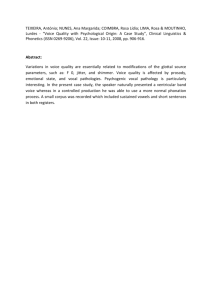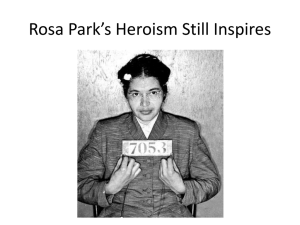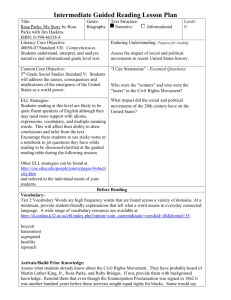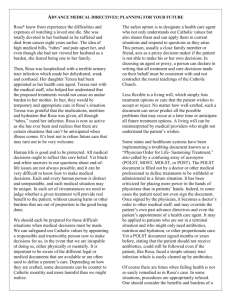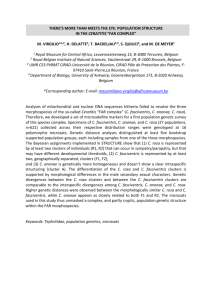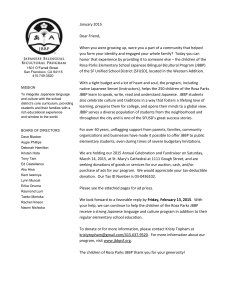Rosa Luxemburg's Response to and Critique of Creativity and Culture
advertisement
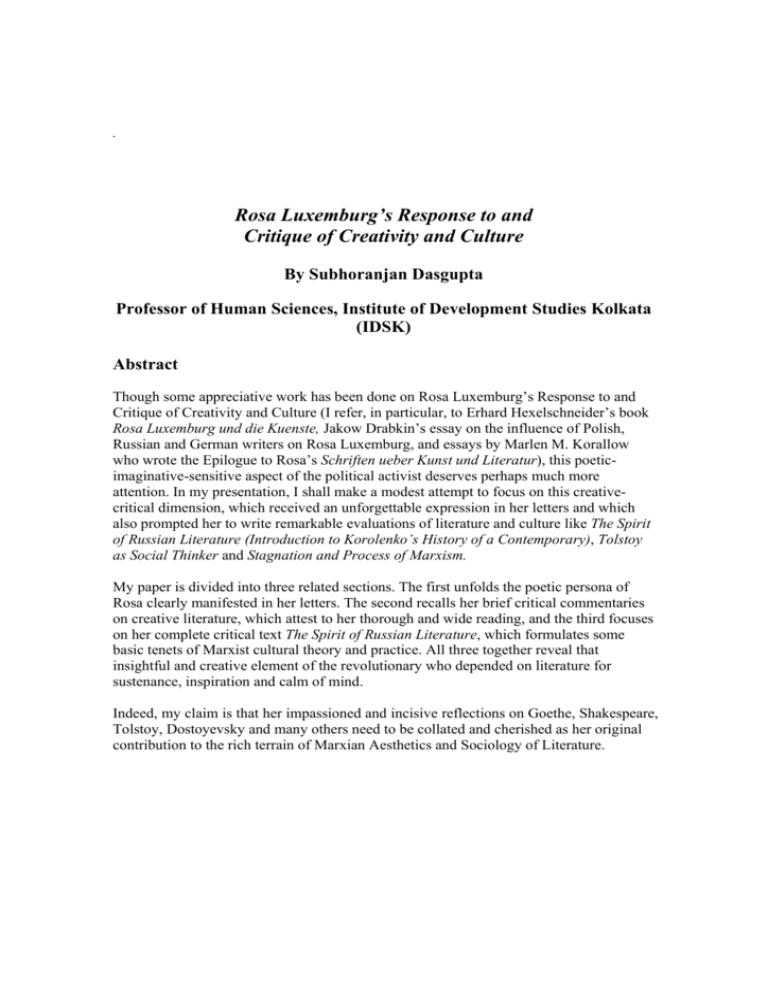
. Rosa Luxemburg’s Response to and Critique of Creativity and Culture By Subhoranjan Dasgupta Professor of Human Sciences, Institute of Development Studies Kolkata (IDSK) Abstract Though some appreciative work has been done on Rosa Luxemburg’s Response to and Critique of Creativity and Culture (I refer, in particular, to Erhard Hexelschneider’s book Rosa Luxemburg und die Kuenste, Jakow Drabkin’s essay on the influence of Polish, Russian and German writers on Rosa Luxemburg, and essays by Marlen M. Korallow who wrote the Epilogue to Rosa’s Schriften ueber Kunst und Literatur), this poeticimaginative-sensitive aspect of the political activist deserves perhaps much more attention. In my presentation, I shall make a modest attempt to focus on this creativecritical dimension, which received an unforgettable expression in her letters and which also prompted her to write remarkable evaluations of literature and culture like The Spirit of Russian Literature (Introduction to Korolenko’s History of a Contemporary), Tolstoy as Social Thinker and Stagnation and Process of Marxism. My paper is divided into three related sections. The first unfolds the poetic persona of Rosa clearly manifested in her letters. The second recalls her brief critical commentaries on creative literature, which attest to her thorough and wide reading, and the third focuses on her complete critical text The Spirit of Russian Literature, which formulates some basic tenets of Marxist cultural theory and practice. All three together reveal that insightful and creative element of the revolutionary who depended on literature for sustenance, inspiration and calm of mind. Indeed, my claim is that her impassioned and incisive reflections on Goethe, Shakespeare, Tolstoy, Dostoyevsky and many others need to be collated and cherished as her original contribution to the rich terrain of Marxian Aesthetics and Sociology of Literature. “It seems to me that I am not really a human being at all … I feel so much more at home in a plot of garden … more in the meadows where the grass is humming with bees, than at one of our party congresses … in spite of it all, I really hope to die at my post, in a street fight or in prison” (1) Rosa Luxemburg Letter to Sonja Liebknecht from the prison in Wronke (February 5, 1917) “Wolken, Voegel, Menschentraenen: Das ist die erste Welt der Rosa Luxemburg; ein Paradies, das wie das Wort Traenen verdeutlicht, gepluendert worden ist, aber als konkrete Utopie… … … … ein Moeglichkeits-Reich, das die Welt, wie sie ist, transzendiert, indem sie ihr die Unschuld zurueckgibt.” Walter Jens: Rosa Luxemburg-- Weder Poetin noch Petroleuse (I) Rosa as ardent poet The above lines are more than mere epigraphs introducing the theme of my paper. In fact, they form an integral part of my text because Rosa’s memorable words and Walter Jens’ tribute reveal that she was an ardent poet and a genuine revolutionary in one breath. Though Rosa herself, perhaps, tried to raise a distinction between the two identities by placing ‘the party congresses’ and ‘meadows … humming with bees’ in mild opposition to each other, in her case, an indivisible source of humanism as well as aspiration for beauty welded the poet and lover of Goethe and Shakespeare, on the one hand, and the fiery disputant and street fighter, on the other, into a single, inseparable being. We can take yet another step forward and claim that because Rosa was a poet, she could discover the poetry of Marxism in its revolutionary principle and in its inspired commitment to the Realm of the Possible (Utopie). While her uncompromising faith in this principle prompted her to write the classic political text Reform or Revolution castigating the prosaic and calculating Eduard Bernstein, the irrepressible poet in her, immersed in her garden, could write to Hans Diefenbach from Wronke on June 29, 1917, “In the sky, which was a sparkling, glimmering blue, some dazzling, white cloud formations stood towering; a very pale half-moon swam between them like a phantom, like a dream.” (2) This, without exaggeration, is prose poetry or poetry-in-prose of a high order attesting to the creative felicity of Rosa. Another related dimension of this same creative urge inspired Rosa to adopt the diction of impassioned exhortation in her articles written for the Rote Fahne during the Spartacist uprising. Her last words in the last article ‘Order Reigns in Berlin’ printed on January 14, 1919, bear witness to the transformation of the language of fervent lyricism into the idiom of deathless defiance: “Order reigns in Berlin!’ You stupid lackeys! Your ‘order’ is built on sand. The revolution will ‘raise itself up again clashing’, and to your horror it will proclaim, to the sound of trumpets: I was, I am, shall be.” (3) Well, as this challenge testifies, like Heinrich Heine, whom she admired beyond measure, Rosa could be the nightingale and the flashing sword with natural ease – her delicate clouds concealed and nurtured the cloudburst of rebellion. What was the source of this inexhaustible poetry in Rosa? The answer to this question is simple. An abundance of love for every living being and creature (barring of course the tyrants and exploiters) and for nature in its varied manifestation inspired her to compose her unforgettable poetry in prose. Moreover, this poetry received its most heartfelt expression in her letters, which according to Antonio Gramsci, is the genre where, “the leitmotif and rhythm of the progress of thought and emotion” attain their most meaningful utterance. (4) While writing to Sonja Liebknecht on May 19, 1917 from Wronke, Rosa described the celebration of nature thus: “Wie schoen ist es jetzt hier! Alles gruent und blueht. Die Kastanienbaume sind in frischem herrlichem Laubschmuck, die Zierjohannisbeeren haben gelbe Sternchen, die Zierkirsche mit dem rotlichen Laub blueht auch schon, und die Faulbaum wird naechstens bluehen.” (5) The quality of this depiction proves that along with the eye and feeling for Nature, Rosa exercised a mastery over the language. As a result, you feel tempted to read such lyrical passages, which can easily be given the structure of free verse, along with the word-paintings of John Keats or Rabindranath Tagore. Rosa’s landscape, with its litany of names, recalls, for example, comparable accounts of Keats who wrote in his ‘Ode to a Nightingale’ “The grass, the thicket, and the fruit-tree wild; / White hawthorn and the pastoral eglantine: / Fast-fading violets covered up in leaves / And mid-May’s eldest child / The coming musk rose, full of dewy wine” … (6) Both the poet-explicit Keats and the poet-implicit Rosa were responding to nature’s fecundity in summer. An intense love for the human being irrespective of his caste, class, colour and creed is evident in these letters; for instance, in the one she wrote to Mathilde Wurm from Wronke on February 16, 1917. Refusing to limit herself only to the pain of the Jews suffering in ghettoes, she said that the victims of rubber plantations in Putamayo, the Blacks in Africa with whose heads the Europeans played basketball (fangball) – indeed, the persecuted all over the world were objects of her love. In her words, “O diese erhabene Stille der Unendlichkeit, in der so viele Schreie ungehoert verhallen, sie klingt in mir so stark, da ich keinen Sonderwinkel im Herzen fur das Ghetto habe: ich fuehle mich in der ganzen Welt zu Hause, wo es Wolken und Vogel und Menschentraenen gibt”. (7) But what is really remarkable to note in this context is that immediately after the moving declaration of her love for the trampled of the world, Rosa speaks of the “wonderful, roseate clouds” she saw the previous evening and quotes her favourite poem of Eduard Moerike which she recited when she saw the clouds,” “In ein freundliches Staedtchen tret ich ein, / In den Strassen liegt roter Abendschein.” (8) This triangular relationship between Poesie, Nature and Humankind forged by her all-encompassing love for beauty and freedom, by her quest for each and every life’s fulfilment and human dignity, and by her passion for creativity’s flourish and nature’s splendour, ensured the flowering of the poet in her. Yet, it would be wrong to claim that the Muse in her swelled only within the walls of her letters and in her last series of articles for the Rote Fahne. In many other texts, the same expressive power ignited the words. Let us take just one example - her brief three-page article following the massive volcanic eruption in the island of Martinique, which was published in the Leipziger Volkszeitung of May 15, 1902. Here the raging politics of condemnation and her boundless love for the suffering coalesce to invoke a language whose sweep erases all barriers between poetry and prose. Comparing the curse of nature with the curse of the colonial tyrants, she wrote, “ And all of you – whether French and English, Russians and Germans, Italians and Americans – we have seen you all together once before in brotherly accord, united in a great league of nations, helping and guiding each other: it was in China. There too you forgot all quarrels among yourselves, there too you made a peace of peoples – for mutual murder and the torch. Ha, how the pigtails fell in rows before your bullets, like a ripe grain-field lashed by the hail! Ha, how the wailing women plunged into the water, their dead in their cold arms, fleeing the tortures of your ardent embraces.” (9) If this is not the damning verse of tyranny yearning for liberation, what is! In point of fact, the uncontainable poet in Rosa crossed the realm of her letters to stimulate other texts as well. (II) Rosa as animated commentator It is not surprising that the creative Rosa responded uninterruptedly to the creativity of others. Like Karl Marx, she also peppered her letters and essays with reactions to the literary texts of others, and again, like Karl Marx, her range of reading encompassed the literatures of several languages – German, French, Russian and English in particular. Erhard Hexelschneider in his monograph Rosa Luxemburg and die Kuenste – this is perhaps the only book on this important subject – has summarized the verdicts of Rosa Luxemburg on German and other literatures in two chapters. (10) These extend from his deep attachment to Goethe, Tolstoy and Shakespeare to his marked lack of appreciation for authors like Romain Rolland, Friedrich Hebbel, Maupassant. Rosa was a voracious reader, and along with the immortals like Dante, Cervantes, Lessing etc, contemporary authors like George Bernard Shaw, John Galsworthy, Henri Barbusse, Maxim Gorky and many others provoked her to pen her opinions. In fact, the frequent evaluative references to the works of these authors might encourage us to conclude that she used the epistolary genre in particular to perform, unwittingly though, the role of the critic. But here too, as in the question of trying to separate her identities of the poet and the revolutionary, Rosa nursed a contradiction. On the one hand, she emphatically said that she did not care to be a dedicated critic yet, on the other, she simply could not help returning to literature again and again to delineate her existential situations and emotional states. While she wrote, rather trenchantly, to Hans Diefenbach on May 12, 1917, “Your idea that I write a book about Tolstoy does not excite me at all. For whom? What for, Haenschen? After all, everyone can read Tolstoy’s books. As for those who cannot get the strong breath of life from Tolstoy’s books, my commentary will not get it across either. Can one ‘explain’ what Mozart’s music is? Can one ‘explain’ the magic of life to someone?”(11), she herself did not hesitate to analyse the virtues of Tolstoy, the writer, in her letters and in two excellent essays titled Tolstoy, the Social Thinker and The Spirit of Russian Literature. Again, though she impetuously claimed, “I regard … the whole stupendous Goethe-literature ( critical literature evaluating Goethe) as waste paper,” (12) Goethe’s poetry returns to her letters like a relentless refrain. It is true that this refrain is different from the clinical assessment of a professional critic, but its intense, subjective estimate is also a part of the overall appreciation. One such animated response is detailed in the letter written to Sonja Liebknecht on July 20, 1917. As we read this letter, it seems that Rosa could not think of existing without Goethe. She wrote, “As I wandered over there today, observing and meditating all the while, a verse from Goethe rang in my ears: ‘Old Merlin in the luminous grave where as a youth I spoke to him’. Of course, you know the rest. The poem, naturally, was in no way connected with my mood or inner concerns. It was only the music of the words and the strange magic of the poem which lulled me into tranquility. I don’t know myself why it is that a beautiful poem, especially by Goethe, so deeply affects me at every moment of strong excitement or emotion. The effect is almost physical. It’s as if with parched lips I were sipping a delicious drink that cools my spirit and heals me, body and soul”. (13) What is crucial to note in this ecstatic confession is the almost tactile nature of the bondage between Goethe and Rosa. Whenever she was aroused, she sought refuge in his poetry; not political tracts but Goethe’s lyrics “cools my spirit and heals me, body and soul.” No wonder, Rosa rejected literature on and about Goethe as dispensable – the latter was simply not in consonance with her devotion. She also tried to influence her friends by inspiring them to come as close to Goethe as possible. In another letter written to Sonja Liebknecht on April 19, 1917, she reminded both Karl Liebknecht and Sonja of a particular poem by Goethe that they should read, “Dieser kleine Winkel erinnert mich jedesmal so lebhaft an jenes Fruehlingsgedicht Goethes, auf das ich Karl aufmerksam gemacht habe und das Ihr beide, glaub ich, nicht so recht bemerkt habt:” (14) The poem referred to begins with the words,” Das Beet, schon lockert / Sich’s in die Hoeh / Da wanken Gloeckchen / So weiss wie Schnee.” Goethe’s poems, like the one just quoted, appealed to Rosa even more because they were set to music by Hugo Wolf. Rosa could not live without music and when Goethe’s verse rang out in Wolf’s notation, her reaction was “Wenn Sie wuessten, welches Himmelslied Hugo Wolf hat daraus komponiert hat!” (15) We read another kind of estimate, not impassioned but persuasive, in her letter to Hans Diefenbach dated June 6, 1917. Eager to disseminate her experiences of reading, Rosa, in this letter, promised to send George Bernard Shaw’s well-known play The Philanderers to her friend. In the appreciation that followed, Rosa with spontaneous insight analysed the distinctive nature of the Shavian art of comedy, which ridiculed the world by obliterating the difference between so-called moral seriousness and highpitched levity. With detailed precision, Rosa recorded the progress of her reaction beginning from a hasty feeling of distaste and ending in hilarious, laudatory laughter. Her comparison of the closing scene in this play with Shakespeare’s A Midsummer Night’s Dream underlined the analogical quality of her reception seeking similarities between texts belonging to the same genre. Tracing the Shakespearean art in the Shavian format, Rosa wrote “The closing scene, in which a masked ball breaks in upon two attorneys in the midst of a bone-dry juristic deliberation, and where the two are led out waltzing, actually works in a Shakespearean manner; it wafts into one’s face the giggly hobgoblin of A Midsummer Night’s Dream. Reading this last scene – sitting in my room alone, around midnight – I broke into those cascades of laughter by which you know me.”(16) That Rosa nurtured a special love for comedy, particularly those written by Shakespeare, is proved by her fulsome praise of As You Like It and its heroine Rosalind in her letter to Hans Diefenbach dated April 28, 1917. In this letter too, instead of rubbishing the job of the critic, she quoted from the review of the drama critic of Leipziger Volkszeitung and asked “Ist das nicht eine feine Analyse? (17) Rosa’s critical admiration for Bernard Shaw emphasizes one of the basic tenets of enlightened Marxian aesthetics, which refuses to judge a work of art by pre-judging the artist’s political point of view and imposing the latter as the one and only criterion. The fact that Bernard Shaw was a Fabian Socialist irrevocably given to reform and therefore opposed to Rosa’s agenda of revolution did not bother her at all. She judged the play on its own intrinsic merit because artistic engagement or literary production always enjoys a high degree of autonomy. This attitude put to practice by Engels when evaluating the royalist Balzac, by Lenin while assessing Pushkin, by Antonio Gramsci when reviewing Pirandello, received another endorsement from Rosa’s critique of Shaw. Moreover, it acted as the leitmotif when Rosa decided to focus on the spirit and soul of 19th century Russian Literature as a full scale critic. It would be wrong to assume that each and every verdict of Rosa on men of letters has been approved by time. Like all other critics, she too committed some mistakes. For instance, her admiration for the British novelist and playwright John Galsworthy has not been shared by many. Though she was, to a certain extent, critical of his novel ‘Fraternity’ in her letter to Sonja Liebknecht dated February 18, 1917, her eulogy heaped on The Man of Property raises no echo at present. Galsworthy, the novelist, remains more or less forgotten. Rosa was, however, diligent in identifying the inherent handicap of cultivated British satire, as she experienced it in the texts of Shaw, Galsworthy and Oscar Wilde. No doubt this genre was useful in pricking with ironic elegance the bubbles of the smug, colonial British bourgeoisie, but, at the same time, it could not travel beyond its predetermined boudoir to explore the actual misery of the people and the real impulse for emancipation. Her refusal to spend more time on Oscar Wilde is also understandable. In fact, one single comment made in her letter to Konstantin Zetkin dated June 18, 1910, stated her basic inclination, “I have had enough of him. I am happy to state that I am returning to that chap Stendhal.” (18) Like Georg Lukacs, who professed an abiding fascination for the novels conceived on the epic scale, Rosa, too, derived undiminished pleasure from the texts of the master-narrators like Tolstoy, Dostoyevsky and Stendhal. The attentive critic in her was able to distinguish between first rate epics like Brothers Karamazov and attempts at epic writing like Roman Rolland’s Jean Christophe. She shared Rolland’s political commitment against war and imperialism, but this affinity did not lead to any facile adulation for the novel. In a letter written to Marta Rosenbaum dated June 26, 1917, she noted, “I have recently read that book. It is a brave work with sympathetic Tendenz. But like all such books belonging to the genre of Tendenzbuecher, it is no work of art, more a pamphlet in belletristic form”. (19) I feel that had Rosa been asked to choose two authors to accompany her to her island of exile, she would have selected Goethe for his poems and Dostoyevsky for his novels. (III) Rosa as a complete critic All these impulses and insights examined in the previous section affirm the indivisible connection Rosa had with creative literature. Her agile and sensitive mind reacted spontaneously to whatever she read, and she did read a lot. One even feels like asking, when did she find the time to read so much in the midst of her far-too-demanding schedule? Indeed, her insatiable hunger for books reminds one of the passion of Marx, Engels, Trotsky and Gramsci, who were also sustained by literature. It is this remarkable dedication that spurred Rosa to write a few classic and complete texts on culture and creativity, such as The Spirit of Russian Literature, Tolstoy as a Social Thinker and Stagnation and Progress of Marxism. The principles of evaluation she applied in these essays not only associate her with the other major proponents of Marxian aesthetics and theorists of culture like Engels, Lenin and Lunacharsky but also carve out a niche for her in that rich and multifaceted realm known as Marxian sociology of art. Though Maynard Solomon has paid tribute to this contribution of Rosa by including her in the representative anthology Marxism and Art, Essays Classic and Contemporary where she is placed with Antonio Labriola, Franz Mehring (with whom she exchanged notes on Schiller) and Plekhanov under the category The Second Generation (20), I fear, that we owe her a much more pronounced recognition. Rosa, the revolutionary-martyr and Rosa the combatant-political theorist crossing swords ceaselessly with Lenin, Kautsky and Bernstein, appear to have overshadowed this attribute of Rosa, which serves as a gateway to the understanding of her complete personality. Creative and reactive every moment, this personality inspired Margarate Susman to observe in 1923, “Herrlichkeit, Schoenheit, lebendigste Offenbarung finden die Augen dieser begnadeten Frau uerberall.” (21) We shall commit no mistake if we regard her text The Spirit of Russian Literature as a classic interpretation of the socio-historical and aesthetic dimensions of Russian creativity, comparable in richness and subtlety to other seminal texts like Lenin’s Leo Tolstoy as the Mirror of Russian Revolution, Leo Trotsky’s evaluation of Russian poetry in his Literature and Revolution and Gramsci’s Marxism and Modern Culture. Let us enumerate the guiding principles of Rosa’s critical method as applied in this text: First: Instead of adhering to an undialectical notion of culture and creativity, which attaches undue weight to the ideology of the writer, Rosa focused on the actual text. In her words, “With the true artist, the social formula that he recommends is a matter of secondary importance: the source of his art, its animating spirit is decisive.” (22) Recalling this faultless guideline, Marry Alice Waters comments, “There is certainly nothing tendentious, crude or narrow-minded in Rosa’s critical vision”. (23) Second: Her stress on the literary text did not lead her to the other extreme of considering it in asocial, esoteric isolation. She related the resplendent flowering of Russian literature in the 19th century with the overall socio-political struggle directed against the Tsarist regime and thereby forged an intrinsic link between the social forces and the surge of creativity. She said, “The chief characteristic of this sudden emergence of Russian literature is that it was born out of opposition to the Russian regime, out of the spirit of struggle. This feature was obvious throughout the entire 19th century. It explains the richness and depth of its spiritual quality, the fullness and originality of its artistic form, above all, it creative and driving social force. Russian literature became, under Czarism, a power in public life as in no other country and in no other time.” (24) Third: By highlighting this element of opposition to a stifling and pervasive tyranny, she suggested, though implicitly, that the aesthetic engagement opened the vistas of the still unattained realm of freedom. That is, in their own different ways, the Russian masters prefigured the other counter-world or the Utopia that was the desired destination. This oppositional element of art played a crucial role later in the construction of neo-Marxian aesthetics by Adorno and Marcuse. When Rosa wrote, “It (Russian Literature) created in the midst of that huge prison, the material poverty of Czarism, its own realm of spiritual freedom and an exuberant culture where one may breathe and partake of the intellectual and cultural life.” (25), we were afforded an invigorating glimpse of the Nicht Seiendes or the Possible, celebrated in great works of art. This aspiration was articulated in the simplest of terms in Korolenko’s story Paradox, where a cripple, born without arms, said, “Man is created for happiness, as a bird for flight.” Fourth: While analyzing the dark landscape in Dostoyevskey’s novels -- in Brothers Karamazov and Crime and Punishment – she did not accuse him of promoting nihilistic decadence. On the contrary, she reminded the reader, “Whoever has experienced his Raskolnikov, or the cross examination of Dmitri Karamazov the night after the murder of his father…. will never again find his way back to the supporting shell of philistine and self-satisfying egotism. Dostoyevsky’s novels are furious attacks on bourgeois society, in whose face he shouts: The real murderer, the murderer of the human soul, is you.” (26) As we read this bold estimate written in 1918, we realize that, in a very clear way, she is the precursor of celebrated theorists like Theodor Adorno and Ernst Fischer who deciphered a similar assault on the bourgeois society in the texts of Franz Kafka. In fact, Adorno’s acclaim of Kafka and Beckett (“They arouse the fear which existentialism merely talks about. By dismantling appearance, they explode from within the art which committed proclamation subjugates from without, and hence only in appearance.”) (27) sounds almost like an echo of Rosa’s assessment of Dostoyevsky. It is strange to note that neither Adorno nor Marcuse acknowledged their debt to Rosa. Were they conscious of it? Fifth: Her incisive response to the differences and similarities among the writers led to valuable comparisons. Whereas all the great Russian writers were directed by their “sensitive social consciousness”, by an “almost aching sympathy” for the marginal and the downtrodden, Chekhov and Tolstoy remained distinctly different in their attitude and style. The spiritual and mystic Tolstoy created tumultuous conflicts but Chekhov, modest and pragmatic, remarked that, “steam and electricity hold more love for humanity than sexual chastity and vegetarianism.” Again, pinpointing the differences in style and nature between Maxim Gorky’s My Childhood and Korolenko’s History of a Contemporary, she observed, “Maxim Gorky’s My Childhood is in many respects an interesting counterpart to Korolenko’s History of a Contemporary. Artistically, they are poles apart. Korolenko, like his adored Turgenev, has an utterly lyrical nature, is a tender soul, a man of many moods. Gorky in the Dostoyevsky tradition, has a profoundly dramatic view of life; he is a man of concentrated energy and action.” (28) The more we deconstruct this essay, the more we comprehend that its commitment and insight, its vibrant sense of history and subtle appreciation of literary artistry, are not replicable in hundreds. Who else but the great narrator August Doeblin paid the most eloquent tribute to the poet and aesthete Rosa in his novel, Karl and Rosa, November 1918: A German Revolution. Doeblin’s epic-like novel swings between vivid and meticulous descriptions of turbulent Berlin in the years 1918-1919 and surreal flights of fantasy undertaken by Rosa with her soul-mate Hans Diefenbach to imagined realms. Inspired to a considerable extent by the letters of Rosa, Doeblin’s narrative unearths once again the poet in Rosa, who like Heinrich Heine loved everything human and beautiful. When Rosa threatened by assailants closing on her, says, “Hannes, look at me, how I am suffering, pursued like a common criminal…But even that cannot wrench my love of mankind from my heart, nor how the thrushes and crows made me glad nor the pussywillow buds on the boughs.” (29), we recognize once again that this teacher of national economy in the party school and the author of the classic text on political economy The Accumulation of Capital had another treasure to cherish. That treasure was the blessed accumulation of her imaginative-creative capital. More than anything else, this irrepressible love for mankind and nature turned Rosa into a spontaneous poet painting imperishable landscapes in her letters; led her again and again to those deathless creative texts of Goethe, Shakespeare, Tolstoy, and Gorky where the Nicht Seiendes or Utopia or the aura of redemption is refracted in brilliant colours and shapes; and, above all, prompted her to ceaseless political activism, which clung tenaciously to the faith that a genuinely free and classless world is possible. Her “meadows where the grass is humming with bees” and her militant role in workers’ meetings and demonstrations are but two related manifestations of the same dream cum praxis aspiring for the unattained Sublime. There is a fair measure of truth in Walter Jens’ assessment, which moulds these two elements together—the emancipatory lyrical and the redemptive political—into one indivisible molecule: “Nein, Rosa Luxemburg’s Heimat war weder die Partei noch ein Land, sondern jenes Stueck Utopia, in dem, nach Ernst Bloch, noch niemand war, dessen Realisierung aber bevorstuende, sobald der sich in Massenaktionen bewaehrende und das Volk, in solchen Aktionen, zum Bewusstsein seiner historischen Sendung fuehrende Internationalismus der Arbeiterbewegung der Bourgeoisie den Garaus gemacht hatte” (30) Notes and References: (1) The Letters of Rosa Luxemburg. Edited, Translated and with an Introduction by Stephen Eric Bronner (Humanities Press, New Jersey, 1993) Page 203. (2) Ibid, Page 218. (3) Readings in Revolution and Organization: Rosa Luxemburg and her Critics. Selected and Introduced by Sobhanlal Datta Gupta (Pearl Publishers, Kolkata, 1994), Page 226. (4) Antonio Gramsci, Philosophy of Praxis in Prison Notebooks. Quoted by Marlen M Korallow in his Introduction to Rosa Luxemburg’s Letters in Schriften ueber Kuenst und Literatur (Verlag der Kuenst, Dresden) Page 87. (5) Rosa Luxemburg. Briefe aus dem Gefaengnis. (Karl Dietz Verlag, Berlin, 2007) Page 42. (6) Ode to Nightingale by John Keats, in any representative selection of Keats’s poems. (7) Rosa Luxemburg’s Letter to Mathilde Wurm in her Schriften ueber Kunst und Literatur (Verlag der Kunst, Dresden) Page 174. (8) Ibid. (9) The Rosa Luxemburg Reader. Edited by Peter Hudis and Kevin B Anderson (Monthly Review Press, New York, 2004) Page 125. (10) Rosa Luxemburg und die Kuenste. By Erhard Hexelschneider (Rosa Luxemburg Stiftung, Sachsen, 2004) Pages 60-72. (11) The Letters of Rosa Luxemburg, Page 205. (12) Ibid (13) Ibid, Page 220 (14) Briefe aus dem Gefaengnis, Page 29. (15) Ibid, Page 31. (16) The Letters of Rosa Luxemburg, Pages 199-200. (17) Schriften ueber Kuenst und Literatur, Pages 162-163. (18) Quoted by Marlen M Korallow in Schriften ueber Kuenst und Literatur. Page 89. (19) Ibid, Page 178. (20) Marxism and Art – Essays Classic and Contemporary. Edited with Commentary by Maynard Solomon (Harvester Press, Sussex, 1979). Pages 144-154. (21) Quoted in the back cover of Schriften … (22) The Spirit of Russian Literature: in Rosa Luxemburg Speaks. Edited with an Introduction by Mary Alice Waters (Pathfinder Press, London, 1970). Page 341. (23) Ibid. (24) Ibid, Page 342. (25) Ibid, Page 351. (26) Ibid, Page 347. (27) Adorno on Brecht in Aesthetics and Politics. Translation Editor: Ronald Taylor (Verso, London, 1977). Page 191. (28) As in 26, Page 362. (29) Karl and Rosa –November 1918: A German Revolution. By Alfred Doeblin, (Fromm International Publishing Corporation, New York, 1983) Page. 448. (30) Walter Jens ‘Rosa Luxemburg—Weder Poetin noch Petroleuse’. Rosa Luxemburg— Herausgegeben von Kristine von Soden (Elefanten Press, Berlin 1995) Page- 13. END Words- 5, 099.
